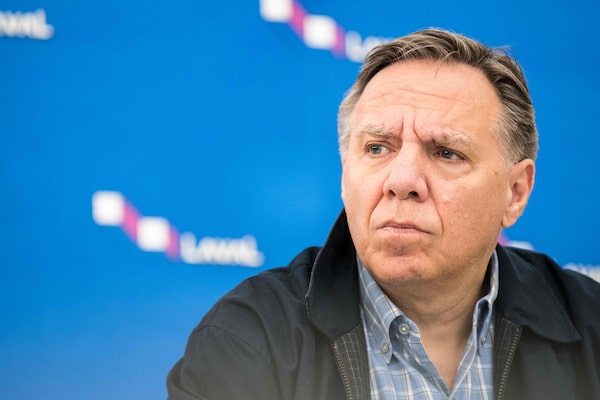
Quebec Premier François Legault speak during a conference in the municipality of Laval, Canada, April 21 2019.MARTIN OUELLET-DIOTTE/AFP/Getty Images
Quebec Premier François Legault flexed his nationalist muscles before the federal party leaders Tuesday, laying out a list of demands to boost the province’s power at the expense of Ottawa.
Mr. Legault asked for more power over immigration, language and tax collection, one week after telling federal leaders to stay out of any court cases contesting Quebec’s controversial ban on the wearing of religious symbols in some public service jobs.
Quebec premiers traditionally present a list of demands during federal elections, but few in the past 20 years have been as forceful as Mr. Legault. The former separatist who renounced Quebec independence several years before leading his Coalition Avenir Québec to power remains an unabashed nationalist. He is pushing hard for more power on an agenda of cultural preservation for Quebec’s francophone majority.
“Quebec is a distinct nation, free to make its own choices in areas linked to its existence,” Mr. Legault said just before the National Assembly resumed sitting for the fall. “I want the federal parties to commit to respecting Quebec’s choices in these areas, which are fundamental for our nation.”
All three main national parties are desperate to woo voters in francophone Quebec, where at least two dozen seats are in play, many of them in three-way races. The Liberal campaign did not comment on Mr. Legault’s demands. The NDP and Conservatives gave partial responses, although some positions of all three parties are already known.
Mr. Legault wants Ottawa to enable Quebec to give a language and values test to potential immigrants, along with the power to set quotas for all categories of immigrants, including the refugee and family reunification cases currently determined by Ottawa.
Talks between Justin Trudeau’s Liberal government had stalled on the issues before the election was called, although Mr. Legault said the Liberal government did not say “no” to Quebec’s immigration proposals. NDP Leader Jagmeet Singh countered the Quebec requests with a pledge to contribute tens of millions more dollars for integration measures. “My values are to help with learning French,” Mr. Singh said while campaigning in Ottawa. “I do not agree with a values test.”
Conservative Leader Andrew Scheer expressed the most openness, in an interview with Radio-Canada Tuesday. “I’m prepared to work with Mr. Legault to make sure Quebec has more autonomy in immigration,” he said.
Mr. Legault would like to impose Quebec’s language laws making French the workplace language on federally chartered companies such as the big banks. The NDP supports the idea while the two other parties are opposed.
Mr. Legault wants Quebec to manage a single tax return on behalf of both the province and the federal government. Quebeckers currently file separate tax returns while other Canadians file to the federal government, which then returns provincial tax revenue to the provinces. Only the Conservatives favour that idea.
The NDP had supported the single tax return, but Mr. Singh reversed the position Tuesday. “It would threaten jobs, jobs in regions where they are vital,” Mr. Singh told reporters as he campaigned in Ottawa. Shawinigan, Que., which sits in an NDP riding, has a major federal government tax centre.
Mr. Legault had already demanded the parties pledge to refrain from intervening “forever” in the religious dress issue. Mr. Trudeau has avoided making a commitment while the two others say they will not intervene.
In his Radio-Canada interview, Mr. Scheer was pressed on another potential point of discord with Quebec when he was asked repeatedly if a Conservative federal government would ever impose construction of an oil pipeline through Quebec over provincial government objections. Interprovincial pipeline projects fall under federal jurisdiction.
“We respect provincial areas of jurisdiction, and there are federal areas of jurisdiction, too,” Mr. Scheer said, adding he would act in the national interest. Quebec Environment Minister Benoit Charette responded immediately, saying there is no “social acceptance” in the province for a new pipeline project.
Editor’s note: A photo cutline in a previous version of this story incorrectly identified François Legault as the Prime Minister of Quebec. He is Premier.
 Les Perreaux
Les Perreaux